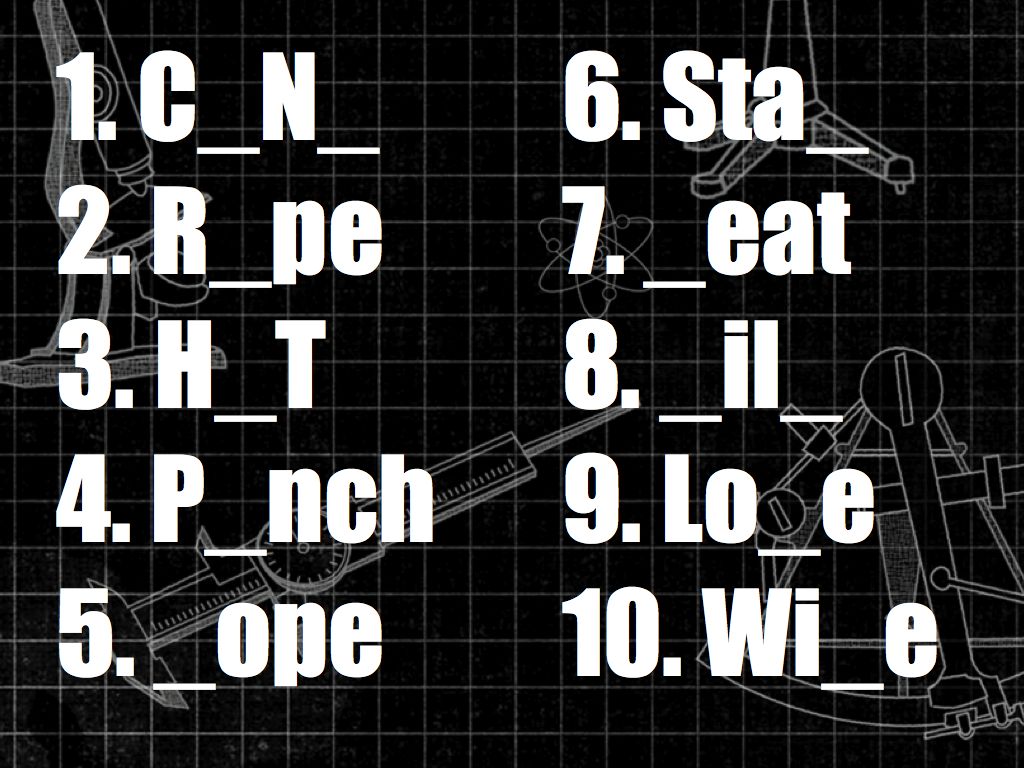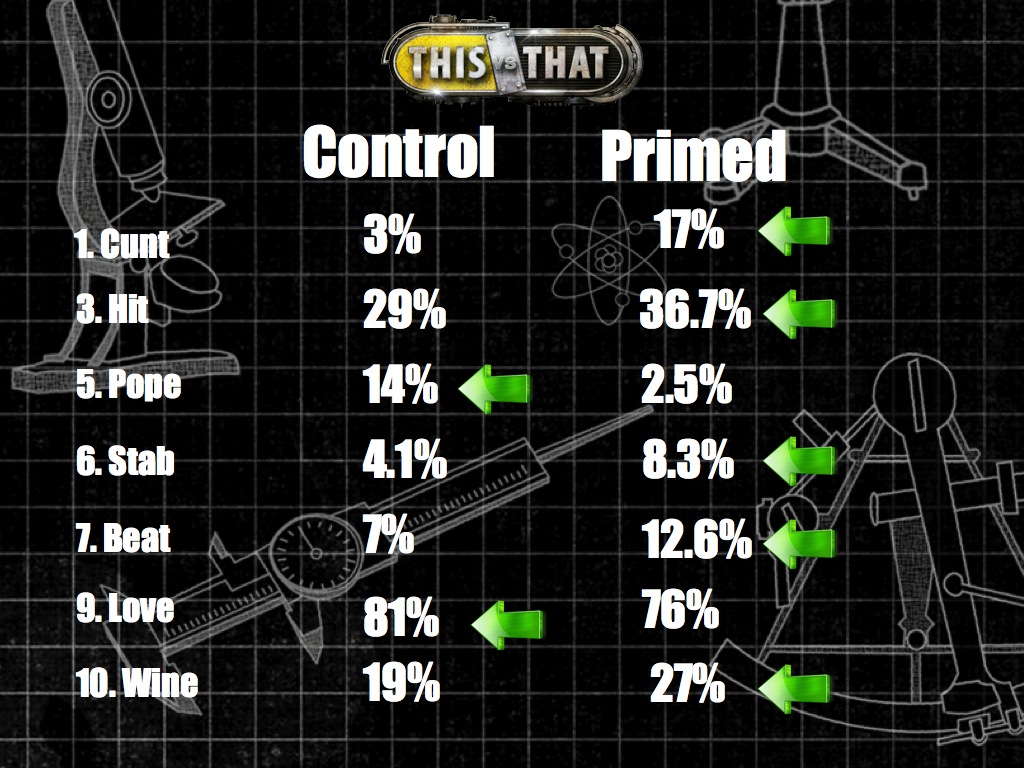
At the recent pop-culture & fan convention, DragonCon, This vs That conducted a series of experiments in human behavior whose goals have just two components:
1. Shed more light on how humans navigate through the world and interact with machines and systems.
2. Improve our navigation skills so we're equipped to make more informed choices and decisions, better decisions, and decisions that can improve our health and save us emotional capital, time, money and even our lives.
Details: For this experiment, we were interested in revealing what effect, if any, mood, disposition and temperament have on decision making. To find out, a group of participants were given a word puzzle in which they had to fill in missing letters to make words. They had 2 minutes to complete the task. This was our control group.

On a different day, an entirely new group of people were given the same word puzzle -- HOWEVER -- before the puzzles were passed out, the participants were jerked around. A lot. Once the participants were seated, we made them annoyed and angry by arbitrarily rearranging the seating in our hotel conference room. We moved people from one seat to another, from the back to the front, from left to right. They were made to arrange themselves by height, hair color, t-shirt color, etc.
Below, the hilarious video of the participants being moved about like human chess pieces.
Before we reveal the results of the experiment, there's some information you need to know, first.
Background: Anyone who commutes in rush hour traffic is familiar with being stuck on the highway -- bumper to bumper -- and becoming increasingly frustrated, hostile and angry. The meeting you're headed to is about to start... and you're still miles away. Your blood pressure rises. So does your anxiety level. You might scream out. Turn up the radio. Bang on the steering wheel. Drive more aggressively. Set your car and couch on fire. Then, when you finally arrive at the office - 30 minutes late -- you discover the coffee pot in the kitchen is empty. So, what do you do?
- Calmly make a fresh pot?
- Skip coffee for one day?
- Grab a mug and smash it against the wall?
There's a theory in psychology called "priming" and it's what happens when you're exposed to some unique stimuli... which later influences the response to another stimuli. In the above example, the increased frustration and anger you experienced in the traffic... very likely influenced you to smash the coffee cup. Either that, or you're the office Nut Bag, who people don't make eye contact with... for good reason.
Priming can happen not just through your emotional state. In one famous experiment, scientists gave one group of participants hot coffee to hold... and the other group cups of cold drinks to hold. Then, each group was asked to describe people, having just their photos to look at. The group holding the hot coffee was more likely to describe the people in the photos as warm and friendly. The people holding the cups with a cold drink, were more likely to describe the same people as aloof and cold.
THE RESULTS:
Overview: Participants who were "primed" to be annoyed, angry and pissed off completed the word puzzles creating fewer words suggesting morality and affection and more words that were harsh, angry and defiant, with the most dramatic disparity between the two groups being the first word puzzle, where participants were given the letters "C_N_".

In the control group, just 3% of people spelled "c-u-n-t"... compared to 17% of the primed group.
Nearly 2X as many people in the primed group spelled "beat", given the letters "_eat". Nearly 7% more people in the primed group spelled "hit" using the letters "h_t". 30% of people from BOTH groups spelled "hot" and 30% spelled "hat."
2X as many people from the primed group also spelled out "stab" given the letters "sta_". "Stay" and "star" each were also spelled by nearly 30% of both groups.
Conversely, in the control group, 81% of the participants spelled out "love" given the letters "lo_e" compared to 76% of the primed group. And, 14% of the control group spelled out "pope" given the letters "_ope" compared to just 2.5% of the group primed to be pissed and angry.
Conclusion: Our evidence strongly suggests that people who are annoyed, pissed off and angry are more likely to use language that is harsh, defiant, violent and crude. In other words, things that happen at point "A" in your day/life... can have a profound effect on how you behave at point "B" in your life, often times regardless of the amount of time that elapses between the two events.
OK. So now that you know this... here's how you can you make better choices and decisions.
For example, if you have been stuck in mind-numbing traffic on your way home from work, traffic that has raised your anxiety and lowered your threshold for annoyances, as soon as you get in is probably a terrible time to share your thoughts on the quality of the food your partner has graciously prepared for dinner. At that moment, you are more likely to use words like "I want to stab you with this fork," and "Where's the wine? I want to hit you with the bottle." Better to wait till you calm down... when you're more likely to recognize the hard work and time that went into dinner's preparation.
Jon Hotchkiss is the creator of This vs That. Please like the show on Facebook, so we can stay in touch. Thank you.
